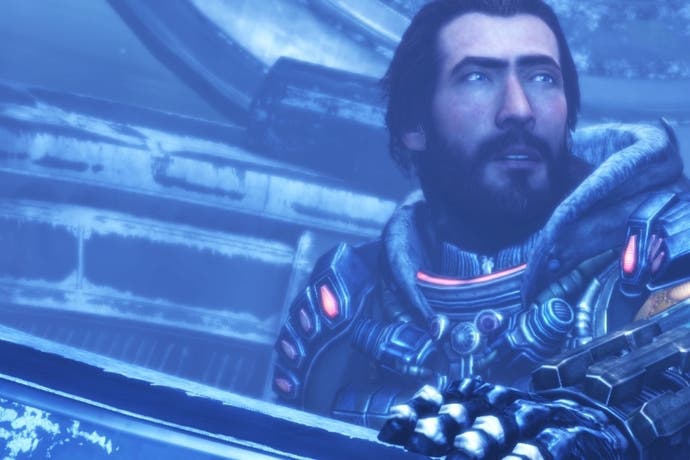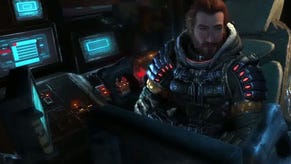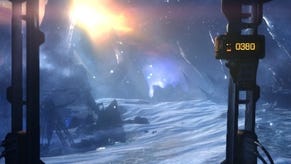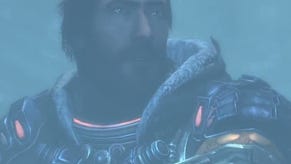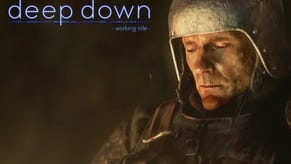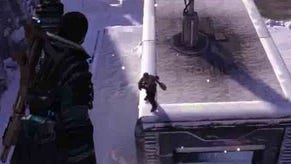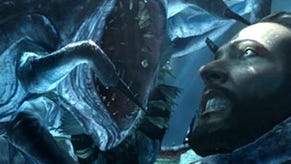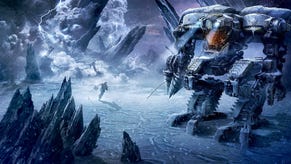How Lost Planet 3 has weathered the storm
Capcom said that outsourcing hasn't worked - so how does that impact Spark's comeback?
It's a hostile world out there, and if the countless creatures out for your blood don't bring you down then the harsh environment surely will. Lost Planet 3's Jim Peyton knows it, and so too does producer Andrew Szymanski, a man who's spent the past year weathering the storm of development, and the storm of negativity that's kicked up when you announce that you're handing the keys to a well-loved franchise over to a studio whose reputation still lingers in the gutter.
The storm doesn't show any signs of letting up, either: scheduled for release this June, Capcom announced recently it was pushing Lost Planet 3 back to the end of August, pitting it perilously close to other action stars Splinter Cell Blacklist and Saints Row 4. And, as developers picked up tools again to tweak Lost Planet 3 a little more, there was another nasty surprise - the outsourcing trend of which Spark's game was a part was responsible for a 'decline in quality', as its note to investors none-too-politely pointed out.
Which most likely isn't the kind of news story you want to wake up to as you prepare for a press event for your yet-to-be released, outsourced game. "I don't think it affects us," Szymanski says. "We're on a path, the game is almost done and that's not going to change. Who knows, if Lost Planet 3 is well received, that could lead to other things.
"It's a constant learning curve. DmC, for instance, had great reviews, and I think that it's doing a disservice to simply say that working with western partners is good or bad, preferred or not preferred. It's about what's right for the title. Do we want there to be games that don't exist because we don't want to try new things? If we hadn't done the collaboration with Spark, Lost Planet 3 wouldn't have happened."
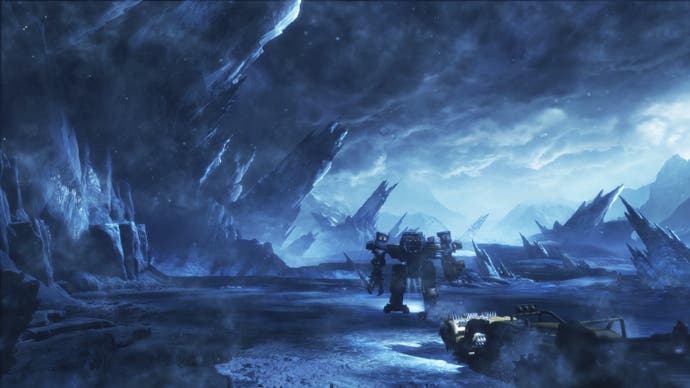
There's been negativity about Lost Planet 3, but there are reasons to be grateful that Capcom's collaboration with Spark did happen. With the focus on Peyton, a newcomer to the strange world of E.D.N 3 that's yet to give up all of its secrets, there's a character to the campaign's opening minutes that's well-rounded and captivating, a soft-edged charm to the slow discovery of this new environment and the odd people who inhabit it.
Lost Planet's DNA is present in small slithers - it's in the world of E.D.N 3 and the Akrid, for sure, but also in a sense of cold isolation and, occasionally, wonder and discovery. It's an aspect of the series that its original creator, Kenji Oguro, was keen to play up for the third installment - and it's one of the reasons that Capcom reached out to Spark to make it.
"Coming out of Lost Planet 2 I was looking at all the variables, and I knew that we wanted to go with more of a character-driven experience," says Szymanski. "Oguro said I really want to do exploration, I want to focus on the struggle and I want strong protagonists. And we said okay, let's look at some developers who have that expertise. Spark's track record wasn't stellar, but they had definitely made a lot of improvements since some of their other previous games."
Spark's track record is difficult to avoid - and it'll remain that way until it gets the chance to wipe clean its slate, its last release being the much-derided Legendary: The Box. It's a point, at least, that Capcom's willing to acknowledge. "Sitting down with them they had a lot of good ideas and good solutions," says Szymanski. "The goal for us - and is this going to be damning them with faint praise - was not to find the 'best' developer, but to find the best developer for this project. And that's a developer that would be able to do a collaboration. We needed to find a developer that would take the suggestions that Capcom brought to the table, bring their own and work on a two-way street to develop the vision."
Beyond the added character and sense of discovery there are other welcome additions Spark's made. Platform mode's a neat way of breaking up the campaign's trawling through environments, with one of the rigs digging in to the ice and extracting minerals while Peyton fends off waves of incoming Akrid. It's horde mode transposed to single player, and it lends a change of pace to the story.
Multiplayer's also changed, though its mutations may well be divisive. There's no campaign co-op, and instead there are four modes spread across six different maps. Some are traditional - as, at this point in time, is the levelling that's being introduced to Lost Planet for the first time - and some display a little more imagination.
Scenario mode splits players into two groups and has them fight side by side before turning their guns on each other. A giant akrid sits in the middle of one of the bespoke maps, and once it's defeated, both teams must compete to bring the energy canister it drops back to their base. Elsewhere, each team gets their own announcer, tying the abstract world of multiplayer into Lost Planet 3's narrative.
Elsewhere there are elements Spark's brought to the Lost Planet world that are less welcome. Visually, Lost Planet 3 doesn't have the gleam of its predecessors, its character muddied by poor textures and an even poorer frame-rate. There's still a couple of months left to go in development, but given the belief that this was ready to ship, it's worryingly shoddy.
"That's exactly the kind of thing we're working on," Szymanski assures. "And it's always the last part of the process. Once again, I don't want to mislead people - are we going to have the super-buttery smooth frame-rate of Lost Planet 2 throughout? Probably not. But the reason is that we're trying to do a lot of pretty aggressive things. And you have to make a decision - do we want to do this thing, even though the frame-rate might drop to 25 or 22, or do we want to allow that to happen occasionally to do these things that we really want to do."
""The goal for us - and is this going to be damning them with faint praise - was not to find the 'best' developer, but to find the best developer for this project."
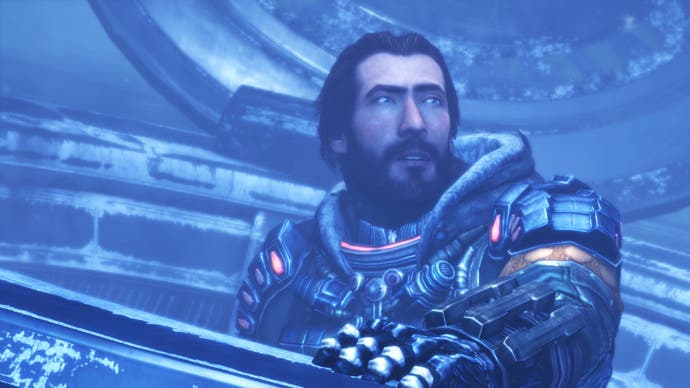
Whether those who come bringing the expectation built by two super-smooth games will be forgiving of Lost Planet 3's less accomplished action remains to be seen, but Szymanski remains optimistic. "If people come to it with an open mind they're probably going to really enjoy this part of the Lost Planet franchise," he says. "We made a conscious decision to go in a different direction. That being said we've tried to keep the core essence of Lost Planet there. I don't think we could have achieved that without the guys in Osaka helping out.
"My belief and my hope for the fans out there is that when they play it, okay they'll be cautious, but they'll see that the essence of Lost Planet is there. And when they play in multiplayer, they'll see it's very different but you've got a lot of the same elements there."
There's every chance that Lost Planet 3 can, at least, stand shoulder to shoulder with its predecessors, and it's been bold enough to take on a new and, at times, exciting direction. There's also every chance, though, that this is the last of its kind, the final vestige of a Capcom philosophy that never quite panned out.
"I would be surprised if it was the last," says Szymanski. "But it might be the last for a while. Every title has its challenges, right? You could say, okay not every title that we've done with western developers has been a huge hit, but that could be said for some of our Japan developed titles too.
"One of my favourite games that we did last year was Asura's Wrath, which was done with a Japanese partner. I love that game, but it was a game designed for a specific person, and that person, well they weren't entirely prevalent. For me it's not about nationality, or whether it's internal or not - it's that not every game can be everything to every person. We've tried to make an experience that we think will be compelling, and will catch the eye of a certain type of gamer."
